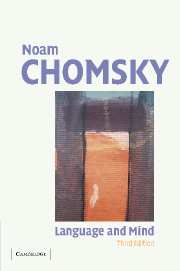Book contents
- Frontmatter
- Contents
- Preface to the third edition
- Preface to the second edition
- Preface to the first edition
- 1 Linguistic contributions to the study of mind: past
- 2 Linguistic contributions to the study of mind: present
- 3 Linguistic contributions to the study of mind: future
- 4 Form and meaning in natural languages
- 5 The formal nature of language
- 6 Linguistics and philosophy
- 7 Biolinguistics and the human capacity
- Index
Preface to the third edition
Published online by Cambridge University Press: 04 September 2012
- Frontmatter
- Contents
- Preface to the third edition
- Preface to the second edition
- Preface to the first edition
- 1 Linguistic contributions to the study of mind: past
- 2 Linguistic contributions to the study of mind: present
- 3 Linguistic contributions to the study of mind: future
- 4 Form and meaning in natural languages
- 5 The formal nature of language
- 6 Linguistics and philosophy
- 7 Biolinguistics and the human capacity
- Index
Summary
The first six chapters that follow are from the late 1960s, mostly based on talks for general university audiences, hence relatively informal. The final chapter is from 2004, based on a talk for a general audience. This recent essay reviews the “biolinguistic approach” that has guided this work from its origins half a century ago, some of the important developments of recent decades, and how the general approach looks today – to me at least.
The dominant approach to questions of language and mind in the 1950s was that of the behavioral sciences. As the term indicates, the object of inquiry was taken to be behavior, or, for linguistics, the products of behavior: perhaps a corpus obtained from informants by the elicitation techniques taught in field methods courses. Linguistic theory consisted of procedures of analysis, primarily segmentation and classification, designed to organize a body of linguistic material, guided by limited assumptions about structural properties and their arrangement. The prominent linguist Martin Joos hardly exaggerated in a 1955 exposition when he identified the “decisive direction” of contemporary structural linguistics as the decision that language can be “described without any preexistent scheme of what a language must be.” Prevailing approaches in the behavioral sciences generally were not very different. Of course, no one accepted the incoherent notion of a “blank slate.”
Information
- Type
- Chapter
- Information
- Language and Mind , pp. vii - xiiPublisher: Cambridge University PressPrint publication year: 2006
